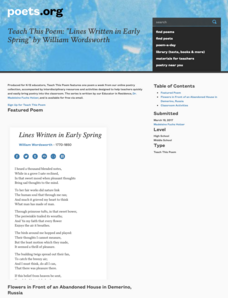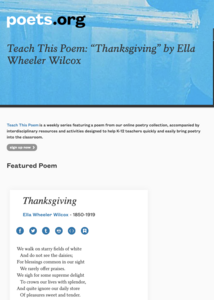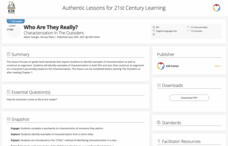Curated OER
Triangular Trade
This lesson has it all, primary source documents, an interactive trade game, clear teacher background information, and sailing to the West Indies chance cards. You will play, trade, and live out the experiences of early colonists in...
Curated OER
It's Your Opinion
Everyone has a different opinion about the characters they read about in books. Have your class explore forming an opinion and finding evidence to support it as they read and discuss what they think about a particular character. They...
Making Evidence-Based Claims: Grade 7
New ReviewThe most effective way to support an argument is with clear and relevant evidence. As seventh graders read and listen to Cesar Chavez's California Commonwealth Club Address, they work through five sections of a textual analysis unit,...
Academy of American Poets
Teach This Poem: “Crisscross” by Arthur Sze
Arthur Sze's poem "Crisscross" launches a lesson that asks scholars to use their observation skills. They first draw an image that reflects what crisscross means to them. They then examine a photograph of a lightning strike and list what...
Academy of American Poets
Teach This Poem: "somewhere i have never travelled,gladly beyond" by E. E. Cummings
Scholars engage in a role-play exercise, compare their demonstration to a time-lapse video, and to a poem by E.E. Cummings. The ensuing discussion asks learners to consider the similarities among the three.
Academy of American Poets
Teach This Poem: "Lines Written in Early Spring" by William Wordsworth
William Wordsworth's poem "Lines Written in Early Spring" lets learners sharpen their observation skills. Class members first closely examine the image "Flowers in Front of an Abandoned House in Demerino, Russia," listing what they...
Texas Education Agency (TEA)
Annotate and Analyze a Paired Passage: Practice 1 (English II Reading)
What do a colt and a boy in a tree have in common? More than might be first apparent. The fourth interactive in a series of ten introduces readers to intertextuality, the process of using abstract thinking to consider how one text...
Utah Education Network (UEN)
7th Grade Poetry: Sonnet Poem
Two sonnets provide seventh graders with examples of Shakespearean sonnets. After discussing the story of the poems and analyzing their rhyme scheme and rhythm, young poets craft a Shakespearian sonnet and share their work with two...
K20 LEARN
Voices from the Past: History and Literature
Art can enhance the understanding of history. That's the big idea in a lesson that has young scholars read Randall Jarrell's poem "The Death of the Ball Turret Gunner" and an excerpt from John Hersey's Hiroshima, which provide a...
K20 LEARN
Mob Mentality and "The Outsiders": Integrating Fiction and Nonfiction
S. E. Hinton's The Outsiders allows middle schoolers to reflect on mob mentality. After reading an article and watching a video about herd mentality, class members find examples in the novel of when characters go along with the crowd and...
K20 LEARN
It’s Never Too Late to Apologize: Character Development and Theme in “The Scarlet Ibis”
Sometimes saying I'm sorry just doesn't cut it. Scholars examine a series of apology poems, songs, and stories and consider each speaker's regrets. Using what they have learned, they analyze James Hurst's short story, "The Scarlet Ibis,"...
Academy of American Poets
Teach This Poem: “Thanksgiving” by Ella Wheeler Wilcox
Victor Laredo's painting "On the Beach" and Ella Wheeler Wilcox's poem "Thanksgiving" allow young scholars to use their noticing skills. Class members identify elements of the painting the artist uses to create the feeling of his work....
K20 LEARN
The New Colossus: Determining Author's Perspective
Introduce young scholars to the concept of the author's perspective with a instructional activity that uses Emma Lazarus's poem, "The New Colossus," as the anchor text. Groups use a T-chart to identify words that reveal the author's...
K20 LEARN
We've Got Character! Literary Analysis: Characterization
How authors bring characters to life and make them believable is the focus of a lesson on characterization. Readers closely examine passages from To Kill a Mockingbird and Dreamland Burning, noting details that reveal the character's...
K20 LEARN
The Monkey's Paw - Be Careful What You Wish For: Foreshadowing
W. W. Jacobs' horror story, "The Monkey's Paw," is used to introduce foreshadowing. As they advance through the story, young readers make predictions about what might happen next and how the story might end. Pairs work through the story...
K20 LEARN
The Most Dangerous Game
Readers of "The Most Dangerous Game" must argue which of Richard Connell's characters is the protagonist or antagonist. The lesson begins with scholars reading selected passages from the story and making predictions about who they...
Curated OER
"The Story of an Hour" Lesson 5: Teacher's Guide and Notes
Learning how to craft a compelling argument supported by evidence and logical reasoning is an essential skill. The fifth lesson in "The Story of An Hour" unit asks young scholars to formulate an argument in response to the question, 'Is...
Curated OER
"The Story of an Hour" Lesson 2: Teacher's Guide and Notes
After reading background information about Kate Chopin, pupils complete their shared reading of her short story, "The Story of an Hour." Participants then consider the irony of the ending.
K20 LEARN
Writing An Argumentative Paragraph: Argumentative Writing
Learning how to craft a cogent argument based on a solid claim, supported with evidence and solid reasoning, is an important life skill. Teach middle schoolers about argumentative writing with a lesson asking them to analyze the claims,...
K20 LEARN
Who Are They Really?: Characterization In The Outsiders
Ponyboy, Johnny, Winston, and Darry come alive in a lesson that focuses on the details S. E. Hinton uses to characterize the Greasers and the Socials. The class first observes the actors' words; the thoughts revealed their effect on...
K20 LEARN
Lord of the Flies Unit, Lesson 3: Behind the Mask
After watching a video about masks from many cultures, class members research the history of masks and build a Driving Question Board. Individuals then create a mask for a character from The Lord of the Flies, justifying elements of...
Anti-Defamation League
Bias, Bullying and Bad Behavior in the NFL
A 2014 case of locker room behavior in the National Football League offers high schoolers an opportunity to get involved in the conversation of bullying and abuse. Class members read about the case and analyze quotes that reveal...
K20 LEARN
Freedom And Restraint: Elements Of Fiction
Kate Chopin's short story, "The Story of an Hour" and John H. Young's "Our Deportment, or the Manners, Conduct, and Dress of Refined Society" offer high school juniors an opportunity to compare the role of women in the 19th century with...
K20 LEARN
Friends, Romans, Countrymen, Lend Me Your Emotions: Julius Caesar
Scholars, high schoolers, class members! With the help of this lesson, you too can identify the three persuasive appeals (ethos, pathos, and logos) the characters in William Shakespeare's tragedy Julius Caesar used to convince their...

























